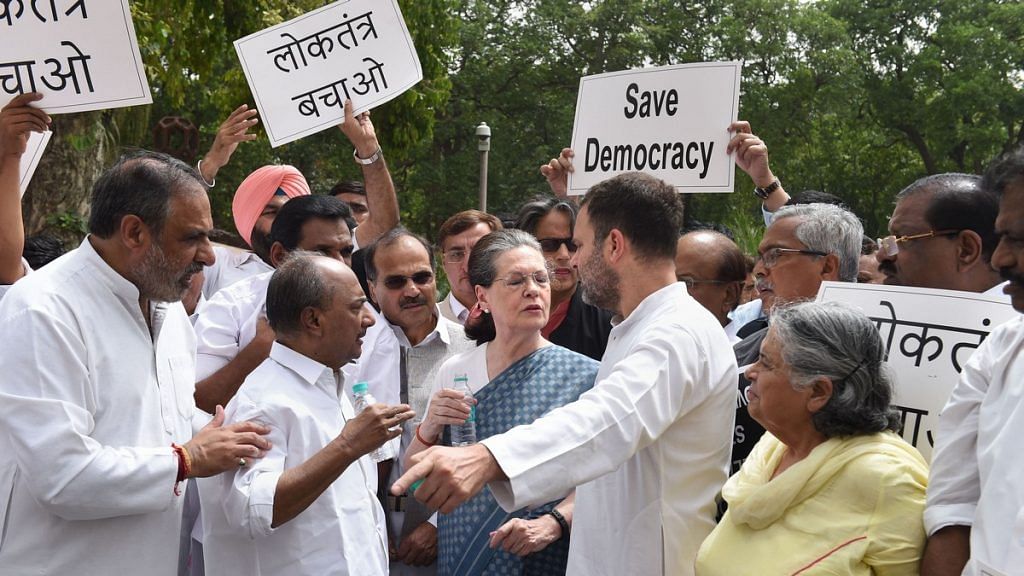What do voters want? Very simply, voters want politicians to solve their problems.
Voters want a politician who can get their FIR filed and get them a job too; a politician who can improve the quality of education in schools and make the hospitals run efficiently; a politician who can prevent terrorist attacks and reduce corruption; a politician who can make the air clean and build new infrastructure; a politician who can improve their economic prospects and keep the inflation low.
And yet, when you look at the news, you mostly see politicians finding fault with other politicians. All they seem to be doing is opposing each other, often for the sake of opposing. Much of this has to do with the media, which loves debate and controversy. Everything is a big fight, never a dialogue.
But the media alone is not to blame. Politicians themselves prefer fighting each other over fighting the issues that ail 1.3 billion people. This is particularly true of the opposition leaders, who seem to think their job is merely to oppose.
The BJP is drunk on power, says Priyanka Gandhi. Modi is ignoring people’s bread and butter issues, says Mayawati. Nitish Kumar is disconnected from the ground reality, says Tejashwi Yadav.
Even before the budget is presented, you know the opposition is going to stand up and say it is anti-middle class, anti-poor, anti-farmer. Playing opposition has become banal and predictable. You can guess what opposition leaders are saying without bothering to see the news. Making statements against the government has become a formality. Rahul Gandhi says the opposition’s job is “easy and enjoyable”. The difficult part, he forgot to add, is to move from the opposition to the treasury benches.
Also read: Why India’s opposition parties don’t have good orators
Positive always wins
Most of the messaging from the opposition leaders is negative. Voters instead want the opposition to explain what they would do if in power, and how they would make things better. Counter-intuitive as it may seem, the opposition needs to propose more than it wants to oppose.
Most successful political campaigns, at least the wildly successful ones, are positive. As UPA-2 became a ‘lame-duck’ government, the Lokpal movement wasn’t simply about protesting against corruption. Instead, it offered a solution. If only the government would create an independent ombudsman, corruption would go away, the movement said.
Then came Narendra Modi, declaring his ambition to be the Prime Minister. It would have been easy for him to say that he should be the Prime Minister because the UPA-2 government is insufferable. That might have brought the NDA to power. But Modi went a step ahead, and did a positive campaign. I’ll build bullet trains and the world’s tallest statue, he said. I’ll take the country to new heights, create crores of good jobs, and make our education system so good that we’ll be exporting teachers to the world, he thundered. The good days are about to come, he promised. Ironically, Modi in power has been doing negative campaigning more than Modi in opposition did.
Once again, a positive campaign succeeded so wildly that Modi became the first Prime Minister with a clear majority since Rajiv Gandhi in 1984.
Arvind Kejriwal became the chief minister of Delhi by persuading people that he’ll keep electricity and water bills in check. The Congress won Madhya Pradesh and Chhattisgarh in 2018 by promising a farm loan waiver. Jagan Mohan Reddy in Andhra Pradesh ran a mostly positive campaign for about 21 long months, starting July 2017. He said these are the nine things I want to do when I become the chief minister. And, he became the chief minister.
Also read: Modi shoots Urdu poetry at ‘negative’ Opposition, throws EVM & Sardar Patel taunts
Agenda-setting
Positive campaigning helps politicians set the agenda. The government looks weak and defensive responding to the opposition’s agenda – or not responding to it. Either way, the opposition carries the day. Public discourse moves to whether Lokpal is a good idea or not, whether Modi’s promises are realistic or not, whether Arvind Kejriwal did the right thing by climbing the electricity pole, whether Andhra Pradesh has the money to implement Jagan’s nine big promises.
If you look at how the national opposition just opposes Modi and does nothing else, you can see why Modi alone sets the agenda for public debates. If the opposition were to set the agenda with a positive campaign, it would take the focus away from Modi and help it gain all the limelight.
Also read: Congress today doesn’t need a leader or an election win, it needs an ideology
Selling trust
A positive campaign helps politicians sell trust. A politician seeking votes is asking people for five years of trust. Any politician can say he or she will create jobs, why should voters trust you in particular? To even begin making people trust a politician, you need to start with a positive campaign.
Modi sold trust using the Gujarat model — I did it in Gujarat, so I can do it across India, he said. But another way of selling trust is by simply sticking to a positive agenda. If you keep saying for five years that you want to do this and that for the people, voters might give you a chance in the next election.
Sick and tired of politicians making empty promises, voters today need to be persuaded that you actually know how to implement them. Showing people the process is important. A politician who goes on a mass outreach campaign saying this is how jobs can be created will likely become the darling of the masses. People want leaders to think of the next generation, not the next election.
I have a dream, said Martin Luther King. Yes we can, said Barack Obama. Make America great again, said Donald Trump. Positive campaigning gives people hope. Negative campaigning makes them despair. And people prefer hope.
Views are personal.
